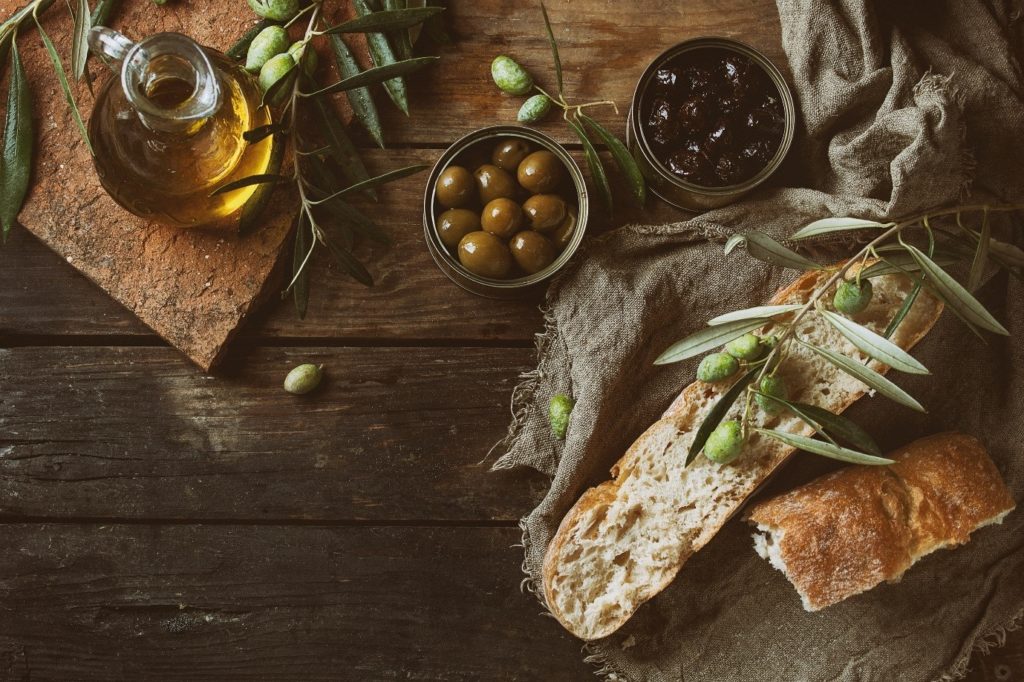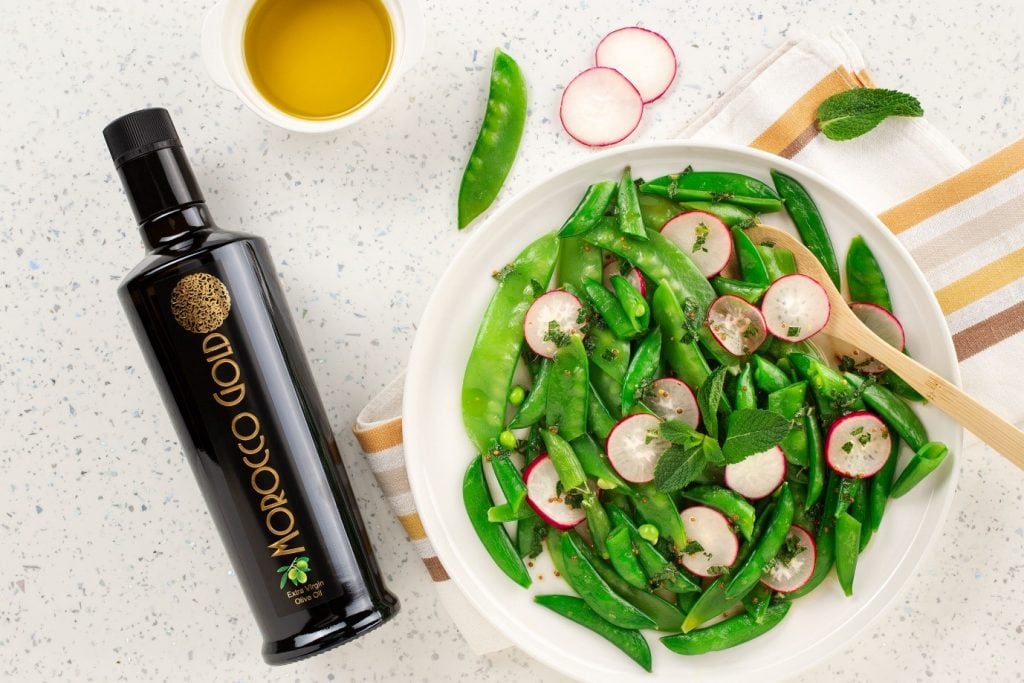By-Product Of The Best Olive Oil Could Have Antioxidant Benefits And Support Exercise
Updated December 14th 2023

Summary:
Contents:
- Extra Virgin Olive Oil Is Packed With Polyphenols
- What Is OliPhenolia?
- Benefits Of Olive Oil Produced OliPhenolia For Active People
- Polyphenols In Morocco Gold Extra Virgin Olive Oil
A natural by-product of the production of extra virgin olive oil production could potentially have antioxidant benefits and support exercise, says new research.
The study, led by nutrition researchers at Anglia Ruskin University (ARU), published in the journal Nutrients, and reported in ScienceDaily, is the first to examine the benefits of natural olive fruit water for recreationally active people. Olive fruit water is a waste product derived from producing olive oil.
Extra Virgin Olive Oil Is Packed With Polyphenols
Polyphenols are a type of phytonutrient found in plant foods, including extra virgin olive oil, that have antioxidant properties.
In fact, the European Food Safety Authority has now approved health claims for extra virgin olive oils with polyphenol content of more than 250mg / kg. Morocco Gold olive oil has high polyphenols well above this level.
They’ve been shown to be beneficial for gut health in multiple ways, including by inhibiting bad bacteria, encouraging the growth of good bacteria, and protecting the gut lining.
Polyphenol rich olive oil is receiving the attention of scientific and health community lately because of their benefits for human body. Polyphenols are chemical compounds that are present in many natural foods. Polyphenol is also used as dietary supplements and can be taken as prescribed medicine.
Polyphenols are phytochemicals that occur in plants and render the colour to plants. Sources of polyphenols include peaches, pomegranate, grapes, oranges, cocoa powder and dark chocolate. However, one of the most important sources of polyphenols is extra virgin olive oil. It is important that this is genuine, unprocessed extra virgin olive oil like Morocco Gold that will still have its polyphenols intact.
Processed or refined olive oils usually have their polyphenols extracted from the oil during filtration and refining.
Research has shown that polyphenols in extra virgin olive oil have a massive and positive impact on health and doctors recommend high consumption of polyphenol sources. They’ve been shown to be beneficial for gut health in multiple ways, including by inhibiting bad bacteria, encouraging the growth of good bacteria, and protecting the gut lining.
What Is OliPhenolia?
As explained by ScieneDaily, a commercially available olive fruit water product, called OliPhenolia, contains a number of phenolic compounds and is particularly rich in hydroxytyrosol.
Polyphenols are a class of micronutrients that have been linked to numerous health benefits, and hydroxytyrosol is one of the most powerful. This polyphenol is abundant in extra virgin olive oil, making it a popular choice for health-conscious individuals.
Hydroxytyrosol is a well-known minor component found in extra virgin olive oil, which is derived from hydrolysis of the polyphenol oleuropein during olive maturation and olive oil storage. The compound plays an important role in the complex and varied flavour of olives and extra virgin olive oil.
It is also a vital component which largely adds to the stability and longevity of extra virgin olive oil.
Hydroxytyrosol has been shown to have antioxidant, anti-inflammatory, and neuroprotective properties, which can help prevent chronic diseases such as cardiovascular disease, cancer, and Alzheimer’s. Additionally, hydroxytyrosol has been linked to improved immune function and a reduced risk of diabetes. With so many potential health benefits, it’s no wonder why hydroxytyrosol is gaining attention in the health and wellness community.
Benefits Of Olive Oil Produced OliPhenolia For Active People
Key outcomes of the study in relation to the health benefits of OliPhenolia for active people were explained in ScienceDaily as such:
The first study into its potential benefits for people who exercise involved 29 recreationally active participants who consumed either OliPhenolia or a placebo, matched for taste and appearance, over 16 consecutive days, and it found positive effects on several key markers of running performance.
OliPhenolia consumption improved respiratory parameters at the onset of exercise as well as oxygen consumption and running economy at lower levels of intensity (lactate threshold 1).
Respiratory parameters at higher intensity (lactate threshold 2) were largely unaffected, but perceived exertion — how hard participants thought their body was working — was improved, as was acute recovery following incremental exercise.
Lead author Dr Justin Roberts, Associate Professor in Health & Exercise Nutrition at Anglia Ruskin University (ARU), said:
“For a long time I’ve been interested in the exercise benefits of polyphenols, such as those derived from cherries and beetroot. To gain similar benefits from olives you would have to consume large quantities daily, which isn’t realistic, so we were keen to test this concentrated olive fruit water.
Like olive oil it contains hydroxytyrosol, but this olive fruit water is a sustainable by-product. It’s typically thrown away during the production of olive oil, and we found a company in Italy — Fattoria La Vialla, a biodynamic farm in Tuscany — who decided to turn this waste water into a dietary supplement.
Ours is the first study to investigate the use of this olive fruit water in an exercise setting and we found that 16 days of supplementation could have a positive influence on aerobic exercise, most notably at submaximal levels.
We found that reduced oxygen cost and improved running economy, as well as improvements in acute recovery, indicate it could potentially benefit those who are undertaking regular aerobic exercise training.
We now intend to carry out further research at Anglia Ruskin University to corroborate these findings. We are also looking to investigate whether this product can be used for marathon training and recovery, as well as test its effectiveness in suppressing inflammation associated with exercise.”
Dr Justin Roberts, Associate Professor in Health & Exercise Nutrition at Anglia Ruskin University (ARU)
Dr Roberts carried out the work with researchers Jorge Pinto and Joe Lillis. The research was funded by Fattoria La Vialla, Arezzo, Italy. The funders had no role in the design of this peer-reviewed study; in the collection, analysis or interpretation of data; in the writing of the manuscript; or in the decision to publish the results.
Polyphenols In Morocco Gold Extra Virgin Olive Oil

The high polyphenol content of Morocco Gold Extra Virgin olive oil is dependent on three factors. Firstly, the variety of the olive. Secondly, the climate and terroir of the growing region. Thirdly, the time in the growing season and the harvest of the crop.
Morocco Gold is pressed from the Picholine Marocaine. The only type of olive to go into our Extra Virgin olive oil. Oil from this variety is renowned for it’s high polyphenol count, oxidative stability and longevity.
Our olives are grown in a valley that is about 2,000 feet above sea level. This helps to create the additional climatic challenges that encourage polyphenol uptake within the olive tree. It is also an area with naturally occurring high phenols in the soil itself.
Over time layer upon layer of decomposed organic matter has contributed massively to the rich content of phenols in the local soil. This contributes to the very high levels polyphenols found in Morocco Gold Extra Virgin olive oil.
Thirdly, our olives are picked when the fruit is young and green. As the olives age on the tree, the colour of the olive changes to red and then black. The olive increases in size producing more oil, but the polyphenol level decreases. Within the farming community there is long experience. Furthermore, to maximise the polyphenol levels we harvest our olives at the optimum time.
We are delighted to say the total polyphenol count in our latest harvest of Morocco Gold extra virgin olive oil is:
| 3,4 DHPEA-EDA | 85 mg/kg |
| Hydroxytyrosol | 5 mg/kg |
| Lignanes | 26 mg/kg |
| Ligstroside aglycone (p, HPEA-EA) | 20 mg/kg |
| Oleuropein aglycone (3,4 DHPEA-EA) | 71 mg/kg |
| p, HPEA-EDA | 65 mg/kg |
| Tyrosol | 372 mg/kg |
| Polyphenols Total | 644 mg/kg |
